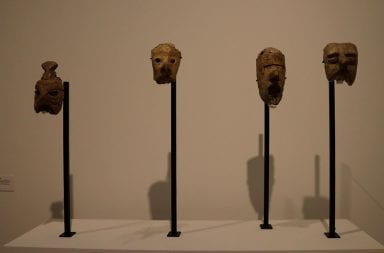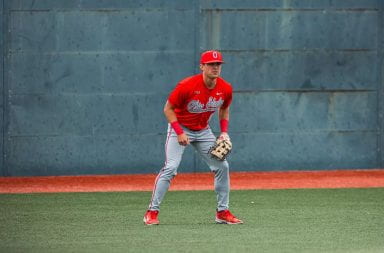Debate season passed the halfway mark last night at the Ohio Union. This year’s crop of candidates for Undergraduate Student Government president debated diversity, off-campus student life, greek affairs and campus crime during the second of three scheduled debates prior to next week’s USG election.
One week before the two-day election beginning April 20, each candidate tried to differentiate themselves from the other four campaigns.
Joshua Gates, a senior in industrial systems and city regional planning, said coming from a multiethnic family and his experience living in Nigeria make him the top choice for USG president. Gates said he has lived in both the minority and majority cultures in his life and gained needed planning experience at OSU as a resident adviser.
“I’ve gained that diversity experience in my life,” Gates said.
Liz Ghandakly, a junior in economics and political science, highlighted the more than 30 issues on her platform she feels she could solve if elected USG president.
“Who has the concrete plans?” she asked. “We’ve researched all of the issues. We have a concrete plan for how to get everything on our platform done.”
Logan Margulies,a junior in political science and international studies, focused on his campaign’s ability to communicate.
“It just comes down to communication,” Margulies said. “We have an unprecedented ability to reach out to the community.”
Margulie’s running mate Tony Gross, junior in exercise science, highlighted his experience with the Sigma Alpha Mu fraternity.
“We’re required to do diversity activities for our community,” Gross said of his fraternity, emphasizing the growth of SAM during his time there. “You deal with all types of frats.”
Suzanne Scharer, a junior in marketing and current USG chief of staff, said she has the passion and experience to lobby the city and community on behalf of the students.
“Instead of spending six months meeting everyone, we have the ability to jump right in,” she said.
Tariq Seifullah, a fifth-year senior in technology education, said nobody has all the answers for OSU students.
“We’re not just leaders, but we’re listeners,” Seifullah said. “We can’t do anything on our own.”
Seifullah said he looks to Martin Luther King for leadership inspiration and vowed to “show the love of Christ to everyone I come in contact with.”
USG Vice-President Deb Mason said USG could make strides to informing students about USG elections.
“It’s not their fault if they don’t know about it, it’s (USG’s) fault. Mason said.
“(Campaigning) is not as out there,” USG President Aftab Pureval said. “There’s not as much chalking and flyers.”
Pureval said it is difficult for candidates to differentiate themselves from each other given the universality of student issues such as rising tuition and campus safety and academic reform. USG campaigns were lengthened this year from two weeks to three, a move Pureval disagrees with, citing the amount of time USG candidates spend on organizing and running campaigns.
“The perception is that USG just campaigns,” he said, adding that the longer election seasons help confirm the opinion. “In effect, a lot of what USG is actually doing is nothing but campaigning.”
Pureval said candidates should shy away from talking about changes needed in USG specifically, though he agrees the organization has its shortfalls.
“There’s been this emphasis on USG as an organization,” Pureval said.
“It’s really wasting that time,” Pureval said. “They’re running to be the voice of all undergraduates.”


